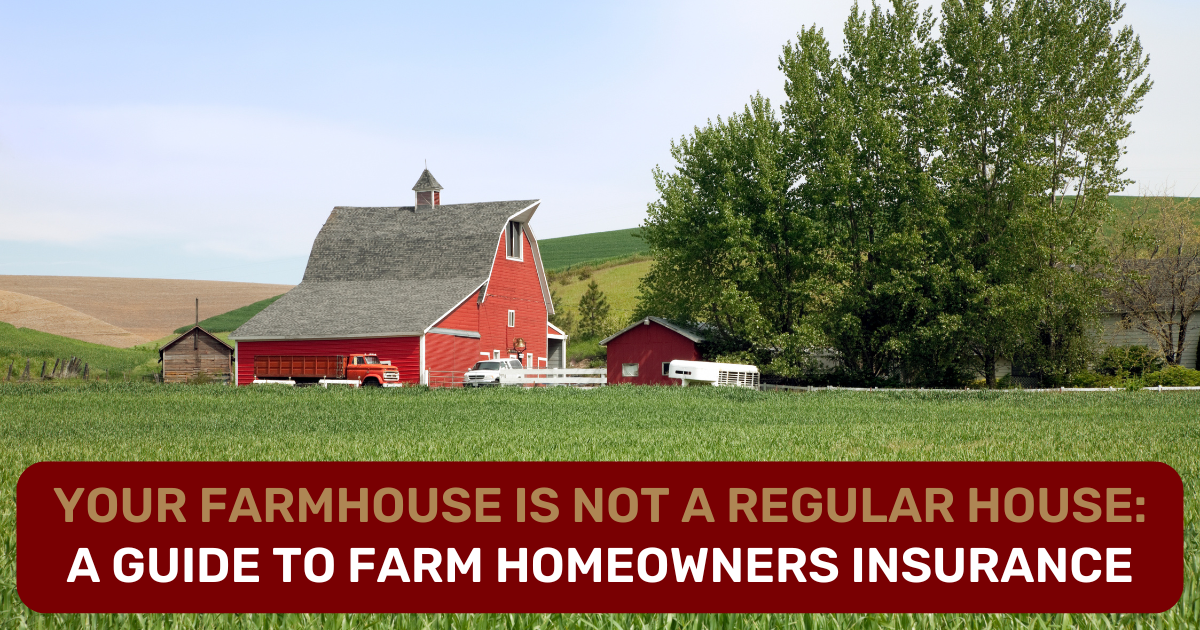
Your Farmhouse is Not a Regular House: A Guide to Farm Homeowners Insurance
Updated: January 9, 2026
Share:
Your home is the heart of your farm— a place for your family to gather and rest after a long day’s work. But in the eyes of an insurance carrier, it’s also on a farm property with a unique set of risks that a standard homeowners policy simply won’t cover. If you have farm buildings, equipment, or business-related activities on your land, you need more than a basic policy.
At Hitchings Insurance, we understand that a farm home requires a specialized approach. This guide will walk you through the essential coverages of a farm homeowners insurance policy, detail the unique risks you face, and provide strategies to ensure your home and livelihood are fully protected.
The Unique Risks Your Farm Home Faces
A farm home is exposed to risks that a typical suburban house is not. Your insurance needs to reflect this reality.
- The Dwelling Itself: While fire, wind, and hail are standard concerns, a farm home also faces risks unique to its environment, such as a tractor collision, or a fire spreading from a nearby barn.
- Farm Liability: This is the most significant differentiator. On a farm, your liability exposure is much higher. A standard homeowners policy excludes coverage for injuries or property damage arising from business operations. A farm homeowners policy provides the crucial liability coverage for:
- Visitors: A guest, customer, or employee getting injured on your property.
- Farm-related activities: A piece of equipment causing damage to a neighbor’s property or an accident occurring during a farm tour or event.
- Outbuildings and Structures: The risks to your home often extend to the other buildings on your property. Your barns, sheds, detached garages, and other structures need their own dedicated coverage against perils like fire, windstorms, and collapse.
- Rural Location: Being located outside city limits can mean a longer response time for emergency services, which can increase the severity of a fire or other disaster. Your policy should account for these increased risks.
Key Coverages for a Farm Homeowners Policy
A farm homeowners policy is a customized blend of standard dwelling protection and specialized farm coverage. The key components include:
- Dwelling Coverage: This is the core of your policy. It covers the cost of repairing or rebuilding your home and attached structures, such as a porch or deck, in the event of a covered loss.
- Farm and Personal Liability: This is the most vital coverage for a farmer. Personal Liability covers non-farm-related accidents, while Farm Liability is a specific endorsement that extends this protection to cover bodily injury and property damage from your farming operations.
- Personal Property: This covers the contents of your home, such as furniture, clothing, and electronics. It’s important to note that this coverage is separate from insurance for your farm machinery and equipment.
- Outbuilding and Structures Coverage: This section of the policy is dedicated to protecting your barns, sheds, workshops, and other buildings on your farm. The coverage limits should be high enough to rebuild these structures and should be separate from your dwelling coverage.
- Water Backup Coverage: Coverage against water damage that comes from internal water losses.
- Extra Expense Coverage: Coverage against unique expenses from a covered claim. This could be to acquire specialized equipment to keep a livestock operation operating, or even extra costs like renting a crane to lift specialized equipment into place.
- Loss of Use: If a covered peril, like a fire or a tornado, makes your home uninhabitable, this coverage pays for additional living expenses, such as a hotel stay or a rental home, while your property is being repaired.
- Collections: Coverage for jewelry, firearms, fine arts, toy tractor collections. These items need to be scheduled to provide coverage against theft or if they’re misplaced or lost.
Proactive Risk Mitigation Strategies for Your Farm Home
While insurance provides a vital safety net, a strong risk mitigation plan is the best way to prevent claims and potentially lower your premiums.
- Prioritize Fire Safety: Install fire extinguishers in all barns, workshops, and outbuildings. Ensure all electrical wiring is up to code and keep flammable materials away from heat sources.
- Maintain Your Property: Regularly inspect your roof, outbuildings, and fencing for damage. A well-maintained property is less likely to suffer a loss and can be a factor in your insurance premium.
- Implement Security Measures: Use locks, motion-activated lights, and security cameras to deter theft and vandalism, especially for valuable tools and equipment stored in sheds or workshops.
- Create a Safety Plan: If your farm is open to visitors or has employees, have a clear safety plan in place. Mark all hazardous areas, post clear signage, and provide proper safety training.
Conclusion: Your Home, Protected
Your farm is a unique blend of home and business, and your insurance should reflect that. A standard homeowners policy will leave you with dangerous gaps in coverage that could expose your family and your business to devastating financial losses.
At Hitchings Insurance, we specialize in helping Ohio farmers find the right protection. We’ll work with you to build a comprehensive farm homeowners policy that safeguards your home and provides the peace of mind you need to focus on what you do best.
Ready to get a comprehensive quote? Contact Hitchings Insurance today for a no-obligation consultation.

